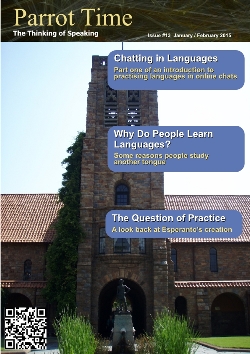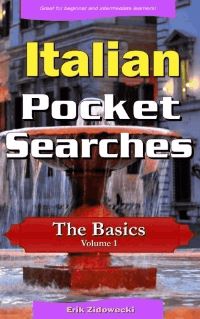The Question Of Practice
An International Language Is Possible

|
In October, 1905, having just returned from an absence of some years in Canada and the Far East, he had his attention turned to Esperanto for the first time by reading an account of the Congress of Boulogne. He had no previous knowledge of, or leanings towards, a universal language; and if he had thought about it at all, it was only to laugh at the idea as a wild and visionary scheme. In short, his attitude was quite normal. The plain fact is that not only one artificial language, but several, already exist, which not only can express, but already have expressed all the ideas current in social intercourse, business, and serious exposition. But here was a definite statement, professing to be one of positive accomplished fact. One of two things: either the newspaper account was not true; or else, the facts being as represented, here was a new possibility to be reckoned with. The only course was to send for the books and test the thing on its merits. Being somewhat used to languages, he did not take long to see that this one was good enough in itself. A letter, written in Esperanto, after a few days' study of the grammar at odd times, with a halfpenny Esperanto-English key enclosed, was fully understood by the addressee, though he was ignorant up till then of the very existence of Esperanto. This experience has often been since repeated; indeed, the correspondent will often write back after a few days in Esperanto. Such letters have always been found intelligible, though in no case did the correspondent know Esperanto previously. The experiment is instructive and amusing, and can be tried by any one for an expenditure of twopence for keys and a few hours for studying the sixteen rules and their application. To many minds these are far simpler and more easy to grasp for practical use than the rules for scoring at bridge. After a month or two's playing with the language in spare time, the writer further tested it, by sending out a flight of postcards to various selected Esperantists' addresses in different parts of the Russian Empire. The addressees ranged from St. Petersburg and Helsingfors through Poland to the Caucasus and to far Siberia. In nearly every case answers were received, and in some instances the initial interchange of postcards led to an extremely interesting correspondence, throwing much light on the disturbed state of things in the native town or province of the correspondent. From a Tiflis doctor came a graphic account of the state of affairs in the Caucasus; while a school inspector from the depths of Eastern Siberia painted a vivid picture of the effect of political unrest on the schools—lockouts and "malodorous chemical obstructions" (Anglice—the schools were stunk out). Many writers expressed themselves with great freedom, but feared their letters would not pass the censor. Judging by the proportion of answers received, the censorship was not at that time efficient. In no case was there any difficulty in grasping the writer's meaning. All the answers were in Esperanto. 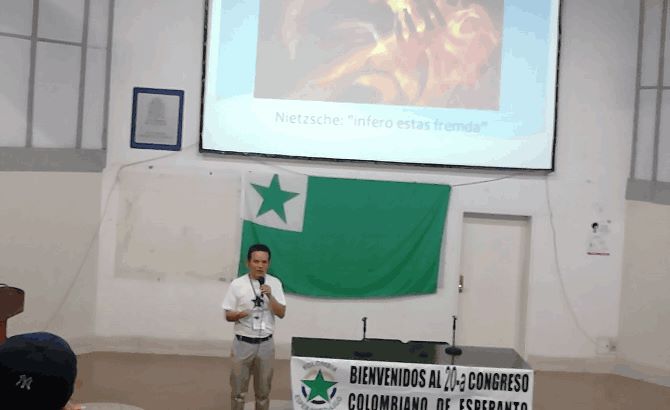 20th Colombian Congress of Esperanto, held between the 1st and 3rd of November 2014 in the city of Medellín. This was fairly convincing, but still having doubts on the question of pronunciation, the writer resolved to attend the Esperanto Congress to be held at Geneva in August 1906. To this end he continued to read Esperanto at odd minutes and took in an Esperanto gazette. About three weeks before the congress he got a member of his family to read aloud to him every day as far as possible a page or two of Esperanto, in order to attune his ear. He never had an opportunity of speaking the language before the congress, except once for a few minutes, when he travelled some distance to attend a meeting of the nearest English group. Thus equipped, he went through the Congress of Geneva, and found himself able to follow most of the proceedings, and to converse freely, though slowly, with people of the most diverse nationality. At an early sitting of the congress he found himself next to a Russian from Kischineff, who had been through the first great pogrom, and a most interesting conversation ensued. Another day the neighbours were an Indian nawab and an abbé from Madrid. Another time it was a Bulgarian. At the first official banquet he sat next to a Finn, who rejoiced in the name of Attila, and, but for the civilizing influence of a universal language, might have been in the sunny south, like his namesake of the ancient world, on a very different errand from his present peaceful one. Yet here he was, rubbing elbows with Italians, as if there had never been such things as Huns or a sack of Rome by northern barbarians. During the meal a Frenchman, finding himself near us English and some Germans, proposed a toast to the "entente cordiale taking in Germany," which was honoured with great enthusiasm. This is merely an instance of the small ways in which such gatherings make for peace and good will. 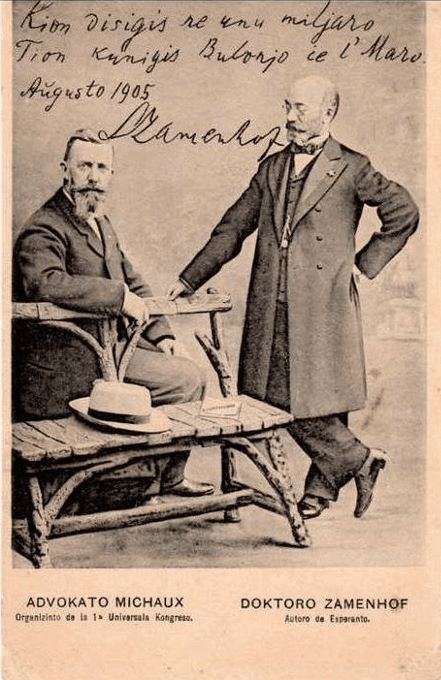 Alfred Michaux and Zamenhof in postcard published approximately 1906 with fake autograph. With all these people it was perfectly easy to converse in the common tongue, pronunciation and national idiom being no bar in practice. And this experience was general throughout the duration of the congress. Day by day sittings were held for the transaction of all kinds of business and the discussion of the most varied subjects. It was impressive to see people from half the countries of the world rise from different corners of the hall and contribute their share to the discussion in the most matter-of-fact way. Day by day the congressists met in social functions, debates, lectures, and sectional groups (chemical, medical, legal, etc.) for the regulation of matters touching their special interests. Everything was done in Esperanto, and never was there the slightest hitch or misunderstanding, or failure to give adequate expression to opinions owing to defects of language. The language difficulty was annihilated. Perhaps one of the most striking demonstrations of this return to pre-Babel conditions was the performance of a three-part comedy by a Frenchman, a Russian, and a Spaniard. Such a thing would inevitably have been grotesque in any national language; but here they met on common neutral ground. No one's accent was "foreign," and none of the spectators possessed that mother-tongue acquaintance with Esperanto that would lead them to feel slight divergences shocking, or even noticeable without extreme attention to the point. Other theatrical performances were given at Geneva, as also at Boulogne, where a play of Molière was performed in Esperanto by actors of eight nationalities with one rehearsal, and with full success. In the face of these facts it is idle to oppose a universal artificial language on the score of impossibility or inadequacy. The theoretical pronunciation difficulty completely crumbled away before the test of practice. 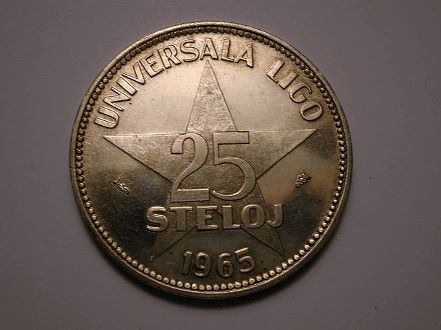 A 25 Steloj Coin - Esperantis Currency - 1965 The "war-at-any-price party," the whole-hoggers à tous crins (the juxtaposition of the two national idioms lends a certain realism, and heightens the effect of each), are therefore driven back on their second line of attack, if the Hibernianism may be excused. "Yes," they say, "your language may be possible, but, after all, why not learn an existing language, if you've got to learn one anyway?" Now, quite apart from the obvious fact that the nations will never agree to give the preference to the language of one of them to the prejudice of the others, this argument involves the suggestion that an artificial language is no easier to learn than a natural one. We thus come to the question of ease as a qualification. |
| The Question Of Practice — An International Language Is Possible | |||||||
| Writer: | W. J. Clark | ||||||
| Images: | |||||||
| |||||||
| Sources: | |||||||
| |||||||
All images are Copyright - CC BY-SA (Creative Commons Share Alike) by their respective owners, except for Petey, which is Public Domain (PD) or unless otherwise noted.
comments powered by Disqus









